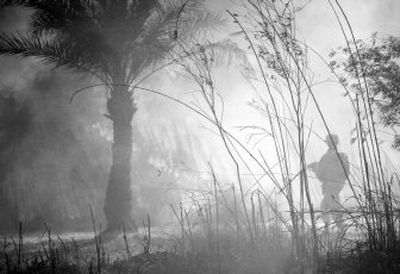U.S., Iraqi officials visit Anbar to highlight gains

AL-ASAD AIR BASE, Iraq – Iraq’s prime minister and two top American officials flew to the blistering western desert Saturday in a rare joint outing to highlight gains there in the fight against insurgents, hours before the military reported the deaths of eight U.S. troops.
One of those killed, a Marine, died in combat in Anbar province, once the site of some of the fiercest fighting in the country – and where the U.S. ambassador, the American commander in Iraq, and the Iraqi leader traveled Saturday.
The Sunni-dominated province has grown calmer in recent months with the flowering of a new alliance among Sunni tribal leaders, the Iraqi government and U.S.-led forces, but peace continues to be elusive – as the death of the Marine demonstrated.
“We are not saying Anbar province is all sweetness and light; there are still a lot of challenges,” said Gen. David Petraeus, the U.S. commander.
Elsewhere on Saturday, three U.S. soldiers were killed in Salahuddin province, north of Baghdad, when an explosion hit their patrol; another died in a roadside bombing in south Baghdad.
Late Friday, a soldier was killed in an ambush near Taji, north of the capital, and two other soldiers were hit by a roadside bomb on Wednesday in eastern Baghdad, the military said.
Al-Qaida in Iraq is still active in Anbar – which includes the cities of Fallujah and Ramadi – and continues to launch devastating attacks, U.S. military officials said. On Thursday, insurgents exploded a car bomb on a passing funeral procession in Fallujah for a tribal leader opposed to al-Qaida. At least 26 mourners were killed.
Despite the security accomplishments, an al-Qaida front group affiliated with insurgent Sunnis warned President Bush on Saturday that the newly approved $95 billion in funds for fighting in Iraq and Afghanistan would not improve Washington’s chances for success.
As part of the U.S.-led security crackdown in Baghdad, American forces raided the Shiite neighborhood of Sadr City early Saturday and captured a “suspected terrorist cell leader,” who helped smuggle powerful, armor-piercing bombs from Iran, the U.S. military said in statement.
After the raid, around 2 a.m., U.S. and Iraqi forces called in airstrikes on nine cars positioning themselves to attack American forces, killing five suspected militants, the military said.
An Iraqi police official said the strikes hit 10 cars in line to buy gasoline, killing three civilians and wounding eight others. The official spoke on condition of anonymity because he was not allowed to release the information.
Iraqi Prime Minister Nouri al-Maliki, U.S. Ambassador Ryan Crocker and Petraeus had planned to travel Saturday to al-Qaim, an Anbar town on the Syrian border, to meet with tribal leaders and survey a $20 million border terminal under construction.
But low visibility prevented their aircraft from completing the trip, and they could only reach the al-Asad air base in Anbar.
So, with temperatures soaring above 100 degrees, al-Maliki and several of his Cabinet ministers met with the Anbar governor and police and army chiefs. Crocker and Petraeus, meanwhile, were briefed by local U.S. commanders.
Just a few months ago, Anbar was thought to be so strongly in the grip of al-Qaida foreign fighters and Sunni insurgents that it was believed a lost cause, the military officials said.
But al-Qaida went too far, killing several tribal leaders, and terrorizing the local population, said Maj. Gen. Walter Gaskin, commander of U.S.-led forces in Anbar.
“All Iraqis live in violence,” he said. “They are sick of it, and al-Qaida overplayed its hand in the murder and intimidation campaign.”
The tribal leaders banded together against al-Qaida several months ago and began working with U.S. and Iraqi forces, he said.
“They didn’t just fall in love with coalition forces. We had a mutual interest: security,” Gaskin said.
Since then, the changes in some parts of the province have been dramatic, he said.